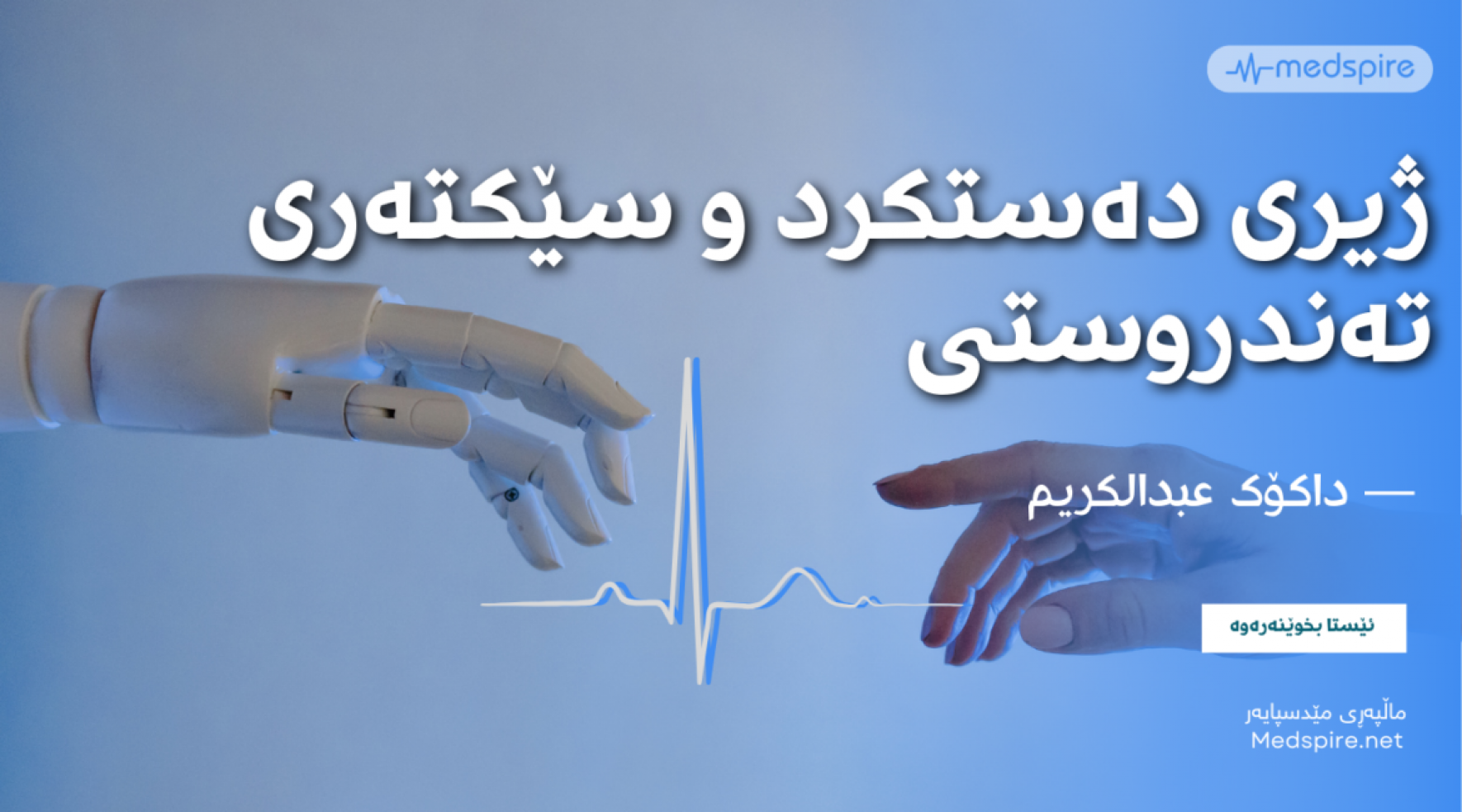Artificial intelligence and health sector
On 28 June 2021 the World Health Organization (WHO) released its first Global Report on Artificial Intelligence (AI) in the field of health and six guiding principles for how to design and use it.
by: Dakok Abdualkarim
The development of AI on the one hand presents opportunities and new challenges to our present era، you have all heard that AI has existed and we may not see a world without it again، AI is here and is here to stay forever، you may have used different types of AI or heard different benefits and uses، the field of use is wide، for example، it can chat with you and become your friend، or it can help you learn lessons and become a teacher. You can guide your journey to find a place and plan a fun trip، and that\'s not the case، and AI is now drawing، playing music and singing، editing your photos that you publish، and if you like، it creates new images that you\'ve never captured and look completely true، AI now returns old black and white images as they were captured today، can create mobile apps، websites and even electronic games. AI can be anything، can AI be your future doctor؟ Is the new era of innovation؟
Dr. Tedros Adhanom، director general of the World Health Organization، said: "Like all new technologies، artificial intelligence has the potential to improve the health of millions of people around the world، but like any technology، it can be misused and harmful." "This new WHO report is a valuable guide for countries on how to use AI to the fullest، while also reducing its risks and avoiding its trap،" he said.
Artificial intelligence can be used to advance the health sector، and is already used in some wealthy countries to improve the speed and accuracy of disease diagnosis and screening؛ to help with clinical care؛ strengthen health research and drug development؛ and support various public health projects، such as disease monitoring، dissemination response، and management of health systems.
AI can also enable patients to have more control and better self-care
Do you trust the medical advice that artificial intelligence gives you؟
Ai technologies with the current capabilities can diagnose a range of diseases. The problem here is that AI often responds better، faster and cheaper than medical professionals. He doesn\'t sleep and he doesn\'t get tired.
Before you believe in AI!
Many of these technologies have common problems. These systems are trained on specific or specific data، and often don\'t work as well for everyone anywhere in the world as they do for the data they\'re basically trained on، and that may not include your personal demographic، which means that what they say isn\'t true to you. Not only that، but some of the data on which these systems are trained are really unsanstrained and wrong. Or worse، they may be biased in their investigations and a certain agenda.
There\'s another problem. As the use of these technologies begins in health care facilities، researchers say they are seeing an increase in the condition known as "conditioning of AI." Medical conditions have been a constant problem since the beginning of the career. In medicine، there is nothing in the name of absolute truth and far from change، the field of medicine is always changing and the existence of conditions in medicine does not fit. But now، doctors may have a tendency to trust AI at the expense of a patient\'s life، and at the expense of their own loss of ability and clinical experience.
AI is now being used in healthcare.
Some hospitals use this technology to treat patients. Some use it to help diagnose the disease، or to devise treatment plans. But Sandra Wachter، a professor of technology and regulation at oxford university in the UK، said the true extent of benefiting from AI is not limited. Sandra Wachter said: "Sometimes we don\'t really know what kind of system is being used."
Research shows that doctors may already have a lot of faith in these technologies. In a study published a few years ago، doctors were asked to compare their symptoms for various skin cancers with the results of the AI system، and the same cancers. Many of them accepted AI or LA results، even when those results were contrary to their clinical views.
There is a very real risk that we are relying on these technologies to a greater extent than we should. And that\'s where the topic of "conditionality" can come in.
First، as we mentioned above، AI is not wrong. These technologies are trained on a historical dataset with their own shortcomings. Sandra Wachter said: "You can\'t send an algorithm - ai - to medical school and teach you how to learn the human body and disease."
As McKraden and Keyes write، "AI can\'t understand، it just predicts." For example، AI can be trained to determine which patterns in skin cells have been associated with cancer diagnosis in the past. But doctors who made past diagnoses and gathered that information may not have been far from wrong.
And recognizing the common things of the past doesn\'t necessarily explain everything to doctors in how to continue treating their patients. Today، doctors and patients need to be in the process of treatment. Advances in ai use should not diminish a patient\'s independence.
So how do we prevent that from happening؟ One of the solutions is to design new technologies that are trained on better and more controlled data that includes all human groups، including all different demographics. Before we can do that، we need to actually collect vast amounts of data on the field - which in itself requires a lot of costs that may not be in line with the demands of people who originally seek to use AI to reduce health costs، Wachter says.
The designers of these AI systems should carefully consider the specific needs of those who are evaluated and treated through their systems. And you have to keep in mind that technologies that work for some groups don\'t necessarily work for others، whether it\'s because of their biology or their beliefs and environments. He said: "People are not the same everywhere.
The best course of action may be for these new technologies to be used in the same way as those that came before them. Just like x-rays and MRI (MRI) help confirm a diagnosis alongside other medical information، not directly resort to diagnosis. People are independent of whether they want scans or not، and what they like to do with their results.


